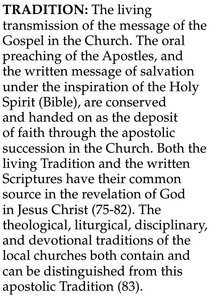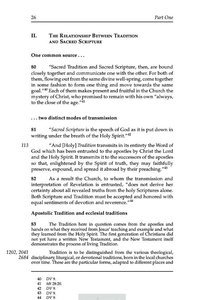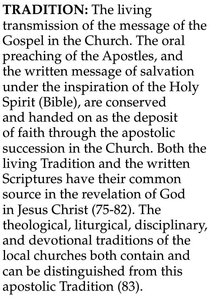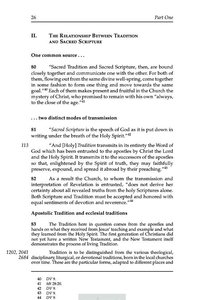- Mar 11, 2003
- 11,683
- 8,019
- Country
- United States
- Faith
- Eastern Orthodox
- Marital Status
- Married
In the recent past, I've noticed that there seem to be some misconceptions on the various Traditional denominations / churches' views on Tradition and Scripture. I'd like to propose a discussion to explain and dialogue on each other's church's view on the relationship between Scripture and Tradition.
What is your church / denomination's view (or your personal view) on the relationship between scripture and apostolic tradition and why?
---------------------------------------
Based on past discussions here, I have seen the following views (with a million variations [emoji4] ):
1. Holy Tradition and Scripture are parallel sources of doctrine; they are equally important, yet distinct. They should work together hand in hand without any division. (I believe this is the Catholic view? I'm sure it is very oversimplified)
2. Scripture is a part of Holy Tradition. It is the most important part of Holy Tradition and all else flows from within it. No other part of Holy Tradition may contradict Scripture, yet Holy Tradition includes additional needed doctrines and practices (Church Fathers, Councils, Creeds, etc.). Not all parts of tradition are determined in the same way, but all are important and needed.
Tradition is the manner of propagating and preserving divine revelation. It is the paradosis, the handing down of what God chose to disclose and communicate to men. It is not a particular "source" of truth or doctrine. Tradition does not and cannot add anything to Scripture, but only elicits what is contained in Holy Scripture and puts it in the right perspective. A faithful guide is required for true exegesis of Scripture. Therefore, Scripture is given and preserved in tradition. Tradition and Scripture are inseparable. (Orthodox Christianity holds this view, though I welcome clarification from my fellow Orthodox Christians)
3. Scripture interprets scripture. Scripture is the test for Tradition. If it is supported by scripture, Tradition is followed. If it is neither supported nor refuted, it is adiaphora (optional?). If it contradicts, Scripture trumps Tradition. (Lutheran and Anglican?)
4. Tradition has no place in determining theology, though some who hold this accept some of the councils. Christians are given the capability and requirement to analyze and interpret Scripture.
A variation may be using scripture with the lens of Tradition while also using culture to further define it.
5. Alternative views that I am not aware of...please also elaborate if you fit in here!
Before we start discussing this topic, as this is the Traditional Theology forum, I'd like to ask everyone to respect the Statement of Purpose (http://www.christianforums.com/thre...y-statement-of-purpose.7859802/#post-66879526) and remember that the forum is designed for respectful discussion of doctrines and practices of churches and individuals that respect and / or hold to some form of Tradition.
I'd like us to discuss this while respecting each other's views and to learn what we believe and why. [emoji4]
What is your church / denomination's view (or your personal view) on the relationship between scripture and apostolic tradition and why?
---------------------------------------
Based on past discussions here, I have seen the following views (with a million variations [emoji4] ):
1. Holy Tradition and Scripture are parallel sources of doctrine; they are equally important, yet distinct. They should work together hand in hand without any division. (I believe this is the Catholic view? I'm sure it is very oversimplified)
2. Scripture is a part of Holy Tradition. It is the most important part of Holy Tradition and all else flows from within it. No other part of Holy Tradition may contradict Scripture, yet Holy Tradition includes additional needed doctrines and practices (Church Fathers, Councils, Creeds, etc.). Not all parts of tradition are determined in the same way, but all are important and needed.
Tradition is the manner of propagating and preserving divine revelation. It is the paradosis, the handing down of what God chose to disclose and communicate to men. It is not a particular "source" of truth or doctrine. Tradition does not and cannot add anything to Scripture, but only elicits what is contained in Holy Scripture and puts it in the right perspective. A faithful guide is required for true exegesis of Scripture. Therefore, Scripture is given and preserved in tradition. Tradition and Scripture are inseparable. (Orthodox Christianity holds this view, though I welcome clarification from my fellow Orthodox Christians)
3. Scripture interprets scripture. Scripture is the test for Tradition. If it is supported by scripture, Tradition is followed. If it is neither supported nor refuted, it is adiaphora (optional?). If it contradicts, Scripture trumps Tradition. (Lutheran and Anglican?)
4. Tradition has no place in determining theology, though some who hold this accept some of the councils. Christians are given the capability and requirement to analyze and interpret Scripture.
A variation may be using scripture with the lens of Tradition while also using culture to further define it.
5. Alternative views that I am not aware of...please also elaborate if you fit in here!
Before we start discussing this topic, as this is the Traditional Theology forum, I'd like to ask everyone to respect the Statement of Purpose (http://www.christianforums.com/thre...y-statement-of-purpose.7859802/#post-66879526) and remember that the forum is designed for respectful discussion of doctrines and practices of churches and individuals that respect and / or hold to some form of Tradition.
A forum dedicated to the respectful discussion of traditional, historic theology; liturgical practices, doctrines, dogmatics; Holy Scripture as found in the various canons of the Church; Church History, etc.
...
This is a Topic driven forum to bridge open discussion for those interested in all the ways Traditional Theology is expressed and lived around the world. Its not meant to exclude those who don't practice Traditional Theology but it is meant to be topic restrictive and non combative to Traditional ideas and structure. If you need to prove Traditional Theology as unbiblical or incomplete, we respect your right to do this in GT and not in this Topical forum ....This is a place to explore with in the defined topic not debate against it.
I'd like us to discuss this while respecting each other's views and to learn what we believe and why. [emoji4]
Last edited:







